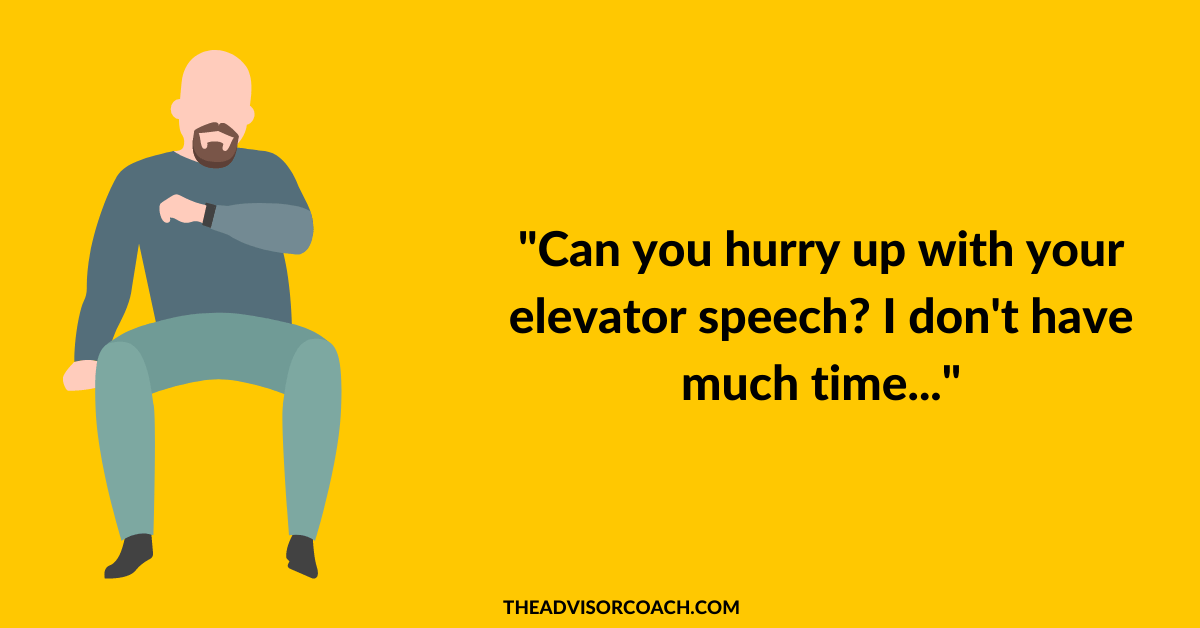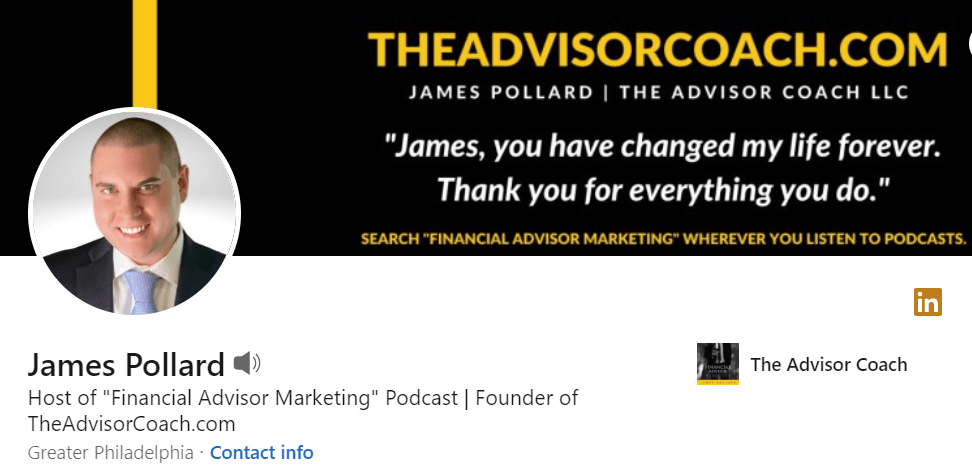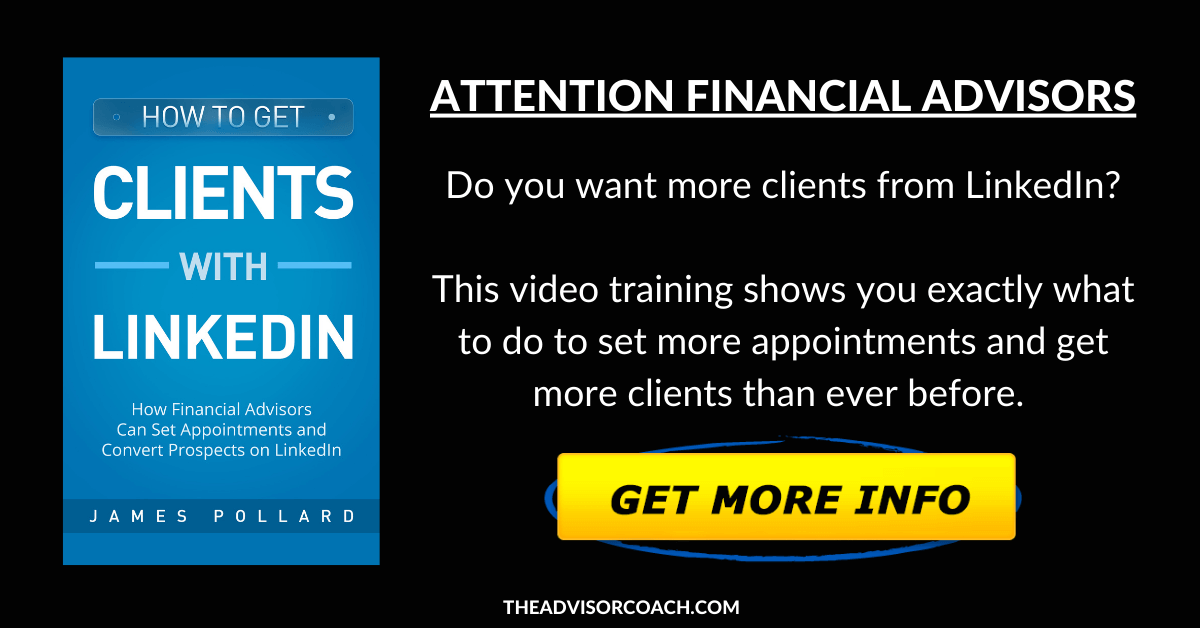9 Elevator Speech Tips for Financial AdvisorsEver been in the awkward situation where you had the opportunity to pitch your services at an impromptu moment in a very small amount of time - and you had no idea what to say?
Every financial advisor is bound to encounter these moments at one point or another in their career. But that doesn’t mean you need to be caught off guard every time. To make the most of any unplanned opportunity, you need an elevator speech. Here's what we'll cover in this article: What is An Elevator Speech?Also called an elevator pitch, the elevator speech is a short and sweet pitch of your services. The idea behind this speech is to be ready to pitch to anyone, at any moment, in a clear and effective manner - even if it means doing so in an elevator with a coffee in one hand and your phone in the other.
It’s the one chance you have to stand out from your competitors and make sure your prospect remembers you. As a financial advisor, your elevator speech should focus on what you do and who you serve. For example, ‘I help teachers plan for retirement’ is a good starting point for an effective elevator speech that can be expanded upon. Why Your Elevator Speech Is A Key Tool As A Financial AdvisorYour prospective clients are busy - chances are, they’ve got several other financial advisors lining up for a chance at landing a meeting with them.
Your elevator speech will determine whether or not you are worth their time. It gives your prospects a clear overview of who you are, what you do, who you serve, and why you do what you do. Not only that, but it delivers this information in a simple and digestible format that makes it easier for people to remember you. As a bonus, it will also help you get clear on all of these things - in fact, knowing your own elevator speech can help your career even if you never end up pitching it to a prospect. One mistake financial advisors often make is to miss obvious opportunities to connect with potential prospects. For instance, if you’re dining with some acquaintances and one of them starts showing interest in your profession, they may be looking for financial advice. Don’t make the mistake of letting this opportunity slide! By having an elevator speech prepared, you’ll be ready to make the most of these situations. How To Write An Elevator SpeechThe goal here is to get people interested in you in a short amount of time - and leave your prospects wanting more.
That’s how you’ll book your meetings. To get your thinking started, imagine something you can say to a prospect to get him or her asking, "Really? Tell me more." For example, I could say something like, "I help financial advisors get more clients." When I say that to financial advisors, if they're a good prospect for me, they will respond with, "Really? Tell me more." From there, I can continue with my elevator speech. To develop your elevator speech, you’ll need to ask yourself a few questions:
The benefits you mention should be concrete and measurable - simply stating that you help people make more money with their investments is not a clear enough selling point. What To Include In Your Elevator SpeechOnce you’ve answered the above questions, you can include the following sections in your elevator speech:
The first half of your speech should be all about you and your clients, but towards the end, you should shift the focus towards the prospect. Ask questions that will shine a light on their potential needs so that you know what pain points to focus on. Once you understand these pain points, it’s much easier to position yourself as a solution and book that meeting. ALSO READ: 9 Awesome Content Marketing Tips for Financial Advisors How Long Should Your Elevator Speech Be?Think ‘elevator ride’ - this tactic didn’t get its name by accident. Your pitch should never be longer than 20-30 seconds.
In words, this translates to about 80-90 words or 8-10 sentences. Any longer and you’ll risk losing your window of opportunity. Tips to Nail Your Elevator SpeechYour work doesn’t end once you’ve got one draft of your elevator speech - you should constantly be striving to improve your speech to boost your chances of growing your client base.
Here are my 9 tips on nailing that 20-30 seconds of golden opportunity time. 1. Don't Pitch - Pique Their CuriosityI've never liked the term "elevator pitch" because you shouldn't be "pitching" like old-school sales books and trainers tell you to.
(P.S. If you're interested in how to sell without being pushy or sales-y, check this out: How to Sell Without Being Pushy) Too many people use their elevator speech as a traditional pitch to sell their services straight away. This is a mistake. Remember, this is not a pitch in the traditional sense - your elevator speech is a communication tool to pique your prospect’s curiosity and leave them wanting to know more about your services. A good place to pique curiosity is in your LinkedIn profile. Take a look at mine... Most LinkedIn power users suggest putting a shortened version of your elevator speech in your headline. I agree, but I also know that curiosity is king.
When people see my profile, they might think:
All of these things add up to increase the odds of people sticking around. If my headline was something boring, like "Marketing Consultant", then people wouldn't be as intrigued. 2. Talk NaturallyTo ensure you’re nailing your speech every time, you’ll want to rehearse often and make sure you know your pitch by heart.
However, make sure that you deliver your speech in a natural way. Many advisors make the mistake of talking in the same way that they write. Even though you’ll be rehearsing your speech, you don’t want it to sound rehearsed. That will most likely put off your listeners since they will feel that they are just another prospect to you. To create a true connection, you need to act natural and lead your speech as if you were just leading a regular conversation. For the same reason, it’s important to eliminate jargon, especially if you’re pitching to someone who doesn’t directly work in the financial industry. The last thing you want is to scare off a prospect by making them feel less intelligent than you are. I also suggest writing naturally on your website, too. This is especially applicable to your "about us" page. If you want my help on writing your financial advisor bio, read this article: How To Write A Stellar Financial Advisor Bio (With Examples) 3. Center on a Common ProblemWhat’s a common problem your clients struggle with regularly?
Figure it out and make it a central part of your elevator speech. Let’s take pre-retirees and retirees as an example. In today’s economic climate, what most people in this group worry about is running out of money before their retirement is over. This means that your speech should definitely address this issue when you’re mentioning benefits as well as searching for their pain points. However, a word of caution... Make sure you are solving a REAL problem for people and not something you THINK is a problem. Imagine someone trying to sell meat to vegetarians. It won't work. It would be a waste of time for both parties. Sometimes I hear people say they hate being pitched. Yet, when I dig deeper, I discover that pitching isn't the root issue. It's the pitches themselves. If someone started pitching me a Goldendoodle grooming kit, I would hate it because I have no Doodle and, as such, no use for it. The pitch would be a waste of my time. However, if someone started pitching a way for me to have healthier food in less time with less money than I'm paying now, I would LOVE it. I need that in my life and want that solution. I would be ecstatic if someone pitched that to me. Again, the problem is not in the pitching. It's in the pitches. A.k.a. the thing being sold and to whom it's being sold. Also, this idea of solving a real problem for people isn't limited to elevator speeches... For example, one of the reasons financial advisors struggle with their landing pages is because they don't offer something their target market wants. Imagine someone trying to build an email list of retirees with a PDF guide titled "10 Things People In Retirement Should Look For When Investing In Penny Stocks". That would do terribly because people in retirement are most likely not interested in penny stocks. Make sense? Okay, moving on... 4. Be BriefI’ll say it again - elevator ride! Focus on what’s truly important about you and your services. Many financial advisors make the mistake of providing incredibly thorough speeches, which discourages curiosity from their prospects.
If your prospect is left with no questions after your elevator speech is complete, you’re doing something wrong. Don't worry if it takes you some time to shorten your elevator speech. I'm reminded of this quote: I have made this letter longer than usual, only because I have not had the time to make it shorter. - Blaise Pascal 5. Know Your AudienceRemember point 3? To find that common problem, you need to know your audience.
Your elevator speech shouldn’t be aimed for a general audience. It will be most effective if you tailor it specifically for your target client, whomever that may be. For instance, if you target ultra-high-net-worth clients, mentioning a story about running out of money during retirement probably won’t appeal to your prospects. Or, if you're a financial advisor who works specifically with teachers, make sure you mention the word "teachers" in your elevator speech. This is because tying your elevator speech to your audience will get their attention and help them pay attention to you more than they would otherwise. Knowing your audience will also help you gain confidence when giving your speech and addressing any follow-up questions that pop up. ALSO READ: 5 Best Niches for Financial Advisors 6. Let Your Passion ShowBusiness people are, above all, just people - and people enjoy spending time with people they like.
You’ve got better chances at winning prospects over by appearing likable and passionate. No one wants to do business with a robot. If you don't believe me, read this article: Will Financial Advisors Become Obsolete? Remember that passionate people are more likely to go above and beyond for their clients - your prospects know this. I've known so many advisors who demonstrate their passion in private or during a one-on-one consulting session but don't show the same passion in front of their clients. Financial advising is a business about helping people and caring for them, so if you care about people, let it show. It's all about doing things that will make a difference in your clients' lives. Plus, if you're passionate you will stay committed to doing the right things in your business every day. You won't get distracted by the markets, product information, staff issues, etc. because you'll have the passion to remind you of your "true north". Let that same passion show in your elevator speech. 7. Practice and TweakNobody gets their elevator speech right on the first go around.
Nor the second, or third. So, keep trying. When you first start presenting your elevator speech, your prospects may get confused or lost and ask questions to clarify what you mean. This is a sign that you need to patch a few holes in your speech - take this as a learning opportunity to improve your speech for next time. And does practice make perfect? Well, according to a study ("Deliberate Practice and Performance in Music, Games, Sports, Education, and Professions: A Meta-Analysis) from Rice University, Princeton University, and Michigan State University, researchers found that while practice won't make you perfect, it will usually make you better at what you're practicing. I know it seems cheesy but try giving your elevator speech in a mirror. How does it flow? Do you seem stiff or robotic? Sometimes seeing ourselves in the mirror helps us make the necessary tweaks and changes we otherwise wouldn't have made. 8. Allow Room For ConversationOne of the most important skills a financial advisor can develop is the ability to have a conversation with another human being.
It sounds almost TOO simple, but it's extremely important. Because a conversation is the first step toward learning about another person, which allows you to evaluate his/her needs, which then lets you determine if you're a good fit to do business together. And after working with financial advisors over the years (as well as digging deep into the psychology of why prospective clients do what they do) I've found that one question seems to work better than all the rest: "Where are you from?" This is a great question to ask because most people love to talk about their hometowns. Plus, it's a conversation starter that lends itself to more conversation. Because when people start telling you where they're from, you can ask follow-up questions like:
My point is this one little question opens the gate for meaningful conversation with prospective clients. If you can weave it (or something similar) into your elevator pitch, you'll reap the benefits. Never finish your speech by closing the door to a conversation. Instead, open the floor for your prospects to talk about their pain points. If they do, you’ll have a chance to ask for a meeting. Besides, the ability to have a good conversation is a must-have skill for a financial advisor. Here are some of my more conversation-fostering tips for financial advisors:
9. Tell A StoryIf there is one technique that has surpassed the test of time, it is storytelling. People love sticking around for a compelling story - especially if it has a surprising twist.
When you tell a story, you let your prospects’ imagination soar - they’ll imagine how their lives could be if only their own story could be similar to the one you just told. Storytelling sells without even needing to directly pitch services. By telling a great story, you’ll have your prospects secretly thinking, “How can this be me?” Storytelling works even when you tell a story about yourself... as long as it isn't boring. Plus, when you tell the right story about you and your business, you'll lay a solid foundation for people to connect with you on an emotional level. Because think about it - most prospects, especially affluent ones, are used to being sold something. Someone who is willing to tell stories and have a conversation with them is a breath of fresh air. The average financial advisor thinks in concrete terms, with tons of numbers and data. However, the use of stories is how we're wired to prefer to receive communications. When financial advisors learn how to meld stories with the data and numbers they also need to convey, they become unstoppable. Finally, when we share our own real-life stories or stories of others, our prospects feel as if they've gotten to know us as authentic people. This is important because authenticity plays a major role in taking someone from a prospect to client. And in no time, they’ll ask to book a meeting with you. Wrapping It UpYou must truly know yourself and your services to deliver a successful elevator speech. By developing your own speech, you’ll discover what is less clear about your business and find ways to work towards clarifying these issues.
Above all, remember to cut the perfectionist attitude and start giving your speech, even if you don’t think it’s ready yet. You’d be surprised by what you can accomplish. 😄 |






